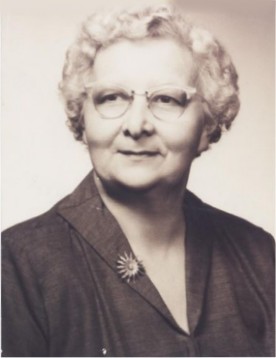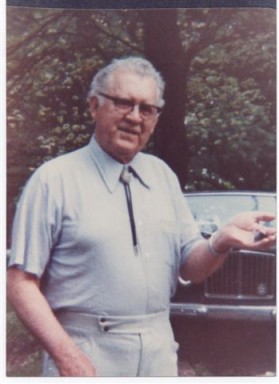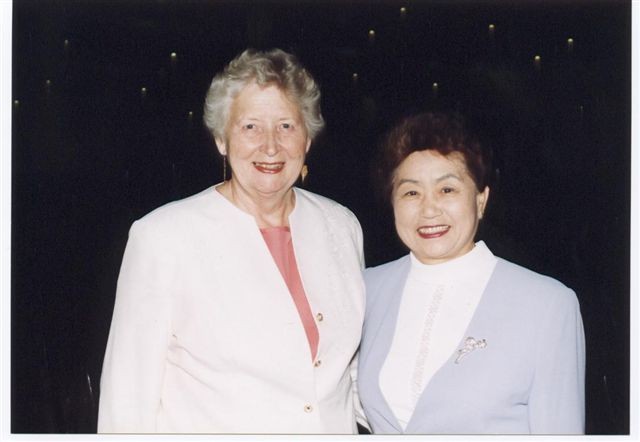|
Susan Harris Pangle |
|
|
Sometimes when I least expect it, Iíll
cross paths with someone I believe would be interesting to try my hand at
doing a story about, and I met such a person at Kingís Grist Mill while I
was there to gather information about a story on the old mill. Her name is
Susan (Harris) Pangle, granddaughter of Berry Harris, who ran the mill a
long time ago. Being able to put the life sheís lived into words is
completely overwhelming to me, but I shall attempt the task, and hopefully
present here a very condensed version about someone who has lived a full
and quite meaningful life. Weíll begin Susanís story with some background information about her family. Her parents, Luther Harris and Margaret Killeffer, (who later became Mrs. Luther Harris), attended Tennessee Tech at the same time. They got acquainted while teaching school in Crawford, Tennessee. Mr. Harris served a principal and Miss Killeffer was the first grade teacher there. They really didnít like each other very much to begin with. Margaret Killeffer thought Luther Harris was a smart aleck, and Luther thought Margaret was a snob. But as time went along, their attitudes toward each other gradually changed, and they were later married. At the time Luther Harris persuaded Margaret Killeffer to become his bride, he was superintendent of schools in Overton County. The first place they lived was called Huckleberry Hut because of the very large huckleberry tree that grew in the yard. This home, in what is now the city lake area of Livingston, was situated on 15 acres with an apple orchard, a garden, and a barn. Susanís two older sisters, Betty and Nancy, were born while they lived there. Because of poor road conditions, Luther Harris rode horseback to many of the schools in the county. When he decided to go back to school to obtain his Masterís degree, the family moved to the Knoxville area. While the Harris family lived in east Tennessee, Mr. Harris was also employed with TVA during the summer. Susan was born during the time her family lived there.
|
|
|
Margaret Killeffer Harris, wife of Luther Harris. |
Luther Harris, a former superintendent of schools in Overton County.
|
|
Susan described her parents to
me like this: "Mother and Daddy thought we were the most fun people they
ever knew. There wasnít anything more fun to Daddy than to come home from
work and spend time with us."Susan told me her father had a marvelous
sense of curiosity, and a drive in the country was always an adventure for
the entire family. Luther Harris was a person who always wanted to know
what was around the next corner, or just over the next hill. "Letís go
find out" was the adventurous way he raised the girls. When the family
went for outing in the car, the girls were not allowed to dose off for
even a short nap because their father did not want them to miss anything
along the way. They were supposed to be watching. Susan said her parents
enjoyed one another very much, and the whole family always had an awful
lot of fun because of the parentsí attitude toward each other. It wasnít
anything unusual for the Harris family to take a picnic supper out in the
woods to watch as a butterfly or a dry fly emerged from its cocoon. Or if
a spider was building a web on the porch of their house, supper was taken
out doors to be eaten as the spider created a work of art right in front
of their eyes. Their father could find any number of fun things for the
family to do, and their mother would help to make it a party for all of
them.
But discipline was something that was included in their upbringing also. Susan remembers how their father did not approve at all of being wasteful. One afternoon, he came in search of the girls, carrying in his hand an apple that one bite had been taken out of and then discarded. He told his daughters he knew who had taken this bite out and threw the apple down, but he wanted that person to tell who it was. When asked, Betty said no, then Nancy said no, and Susan said it sounded pretty good to her, so she said no too. He told them again he knew who did this, and "I need for you to tell me the truth", so he asked a second time and got the same reply from all three once more. He then walked over to Susan and placed the apple against her mouth. Since she had just lost a front tooth, the bite out of the apple gave her away, and she was paddled for not telling the truth. She said one of the best lessons she ever learned was "Do not lie to your father, or at least donít get caught if you do." A great-grandmother, Linda Speck Harris, someone they referred to as Granny Lyndie, was someone Susanís family loved to have come and visit. She lived on the same farm on Highland Mountain for over 100 years. Susan said her Granny Lyndie had a very positive attitude about everything, and it showed in the way her eyes sparkled. On one visit, Susanís mother persuaded Granny Lyndie to take a bath and wash her hair. This was a new experience for Granny Lyndie since her baths were usually taken from a wash pan in a building referred to as the apple house. So the idea of having a bath in a tub and getting wet all over was somewhat frightening to her, especially since it was the middle of winter. But with gentle encouragement from Susanís mother, this experience turned out to be a very pleasant one, and Granny Lyndie was happy she had let herself be talked into trying something new. The Harris home was always open to friends and relatives, and was a place where there was always lots of company. Through the years, a total of fifteen people came to stay with them in order to attend Tennessee Tech. Some were cousins, and some were her fatherís vocational rehabilitation clients with no where else to stay, and being able to afford the cost of dorm rooms was out of the question. Her father thought each one deserved a chance to go to college, and it was by opening their home to these individuals that many were able to complete their college education that otherwise would not have been possible. Grandparents also lived with them at different times in their lives. Susan told me that life was always exciting at their home. She shared this information about one family member in particular that lived with them for many years: "When I was three, my grandfather Killefferís sister needed a place to live. She was an "ole maid" from Lancaster, Pennsylvania. She was 70 when she came to live with us, and stayed in our home until she died at age 82. She and I shared a bedroom. She was supposed to be my babysitter, but since she didnít know anything about children, I had a pretty free time." The Harris family moved to Cookeville the year Susan started fourth grade. Susan shared this about their church life: "Because my motherís father was an Episcopal priest, my mother was an Episcopalian. When we moved to Cookeville, there was no Episcopal church, so mother went to the Methodist church with daddy where we all became very active members. I became a Methodist when I was about nine. Later the Episcopal church came to town, so I went to church with mother in the morning, and we all went to church on Sunday night with daddy. This worked just fine. I had a good time in all the youth meetings, and learned to lead recreation activities. I guess this had a lot to do with my choice of majors in college. I went to Tennessee Tech and did a good deal of leading folk dancing and games, etc. I was a counselor at Camp Monterey for four years while in college. The most important thing I learned through camp counseling was that I could get along with a lot of different people. "Miss Dolly", the camp owner/director, encouraged me and made me believe I could do anything." "After TTU, I went to UT to get my M.S. I did not know exactly what I wanted to do, and I had always felt that life had been good to me. I had lots of chances to learn and develop my own faith, so I decided I should try to help other people." So at age 24, Susan decided to try the mission field, and boarded a ship headed for Korea. But that particular ship was not a passenger vessel. It was a freighter. Hereís what she says about her ocean voyage to Korea: "The ship was The S.S. Fairport owned by the Waterman Line whose home port was in Mobile, Alabama. I was the only passenger and the only woman on board. Our destination was Inchon, Korea. The president of the Waterman line told me they did not take passengers to Inchon because there was no dock, and sometimes the seamen had to go over the side of the ship by way of rope ladders. My response to him was that I had my blue jeans in my suitcase, and that would be okay with me. The crossing was to take eleven days, but we had such bad weather, it ended up taking twenty-one days. I found out you can get SO sea sick. I still get queasy when I smell diesel fuel and coffee. My assignment in Korea was at Ewha Womanís University in Seoul. There was no better place in the world for me. I loved the Koreans, and they seemed to love me. I got to do everything I especially enjoyed doing. I taught girls swimming, dancing, tumbling, camping, along with teaching English also. They in turn taught me Korean, and how to use chopsticks. I also learned respect for a nation that had been bombed, their loved ones killed, their lives turned upside down, and still they had the greatest sense of humor you could imagine. When I finished my three years in Korea, a friend and I visited in sixteen different countries around the world on our way back to the United States. It was a great trip." After returning to the United States, Susan took a job as the associate dean of women at Tenn Tech in addition to being a physical education teacher. She later became Director of Social Activities. She met and married Charles Pangle who taught agricultural at Tenn. Tech for twenty-seven years in addition to being involved in coaching baseball, football, tennis and basketball. Susan has also served for ten years as director of Triad Youth Home for boys ages 13-17, and for the last seven years, has been director of Magnolia Place where she works with people who suffer from memory loss. Along with her work with Magnolia Place, she is also involved in her churchís adult day care one day a week. She also finds the time to run errands for a shut-in. Her husband passed away six years ago, so the running of their farm is something else she takes care of too. Itís obvious that the teaching of Susanís parents instilled in her many years ago are still very apparent in her life today. The adventurous spirit of her father, and her motherís way of making life always interesting continue to shine through in Susan today. She is a wonderful example of a person who has seized every opportunity to make the most of each day she has been given. I have only just skimmed the surface of the life she has led, leaving many, many stones unturned that would tell one chapter after another of a very interesting and unusual life. Iím glad our paths crossed that day at the mill, and that Susan was willing for me to try my hand at sharing her story.
|
|
|
Susan Harris Pangle and a fellow teacher, Sung Jungsoon, during the time they both taught at Ewha Woman's University in Seoul, Korea.
|
|


